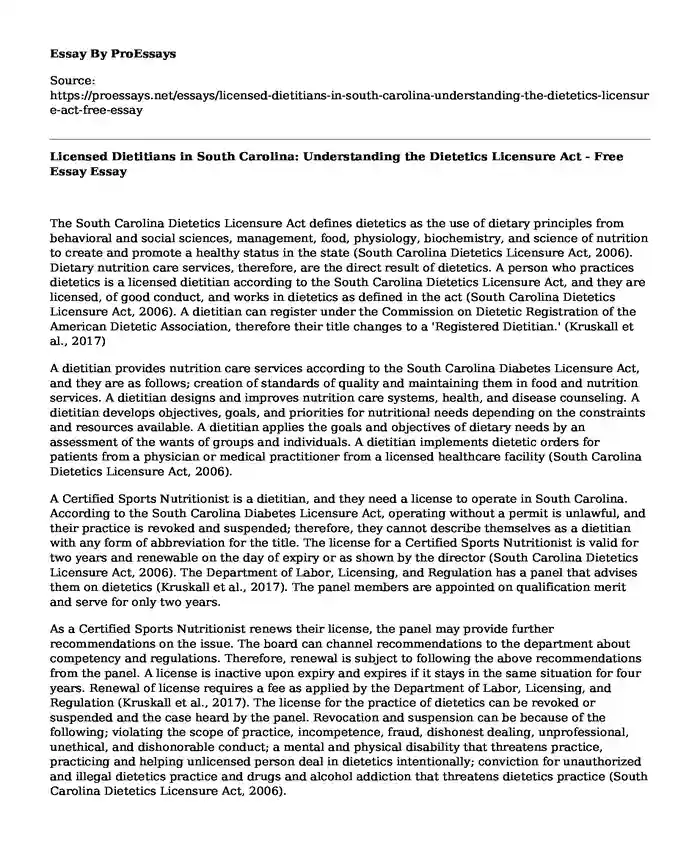The South Carolina Dietetics Licensure Act defines dietetics as the use of dietary principles from behavioral and social sciences, management, food, physiology, biochemistry, and science of nutrition to create and promote a healthy status in the state (South Carolina Dietetics Licensure Act, 2006). Dietary nutrition care services, therefore, are the direct result of dietetics. A person who practices dietetics is a licensed dietitian according to the South Carolina Dietetics Licensure Act, and they are licensed, of good conduct, and works in dietetics as defined in the act (South Carolina Dietetics Licensure Act, 2006). A dietitian can register under the Commission on Dietetic Registration of the American Dietetic Association, therefore their title changes to a 'Registered Dietitian.' (Kruskall et al., 2017)
A dietitian provides nutrition care services according to the South Carolina Diabetes Licensure Act, and they are as follows; creation of standards of quality and maintaining them in food and nutrition services. A dietitian designs and improves nutrition care systems, health, and disease counseling. A dietitian develops objectives, goals, and priorities for nutritional needs depending on the constraints and resources available. A dietitian applies the goals and objectives of dietary needs by an assessment of the wants of groups and individuals. A dietitian implements dietetic orders for patients from a physician or medical practitioner from a licensed healthcare facility (South Carolina Dietetics Licensure Act, 2006).
A Certified Sports Nutritionist is a dietitian, and they need a license to operate in South Carolina. According to the South Carolina Diabetes Licensure Act, operating without a permit is unlawful, and their practice is revoked and suspended; therefore, they cannot describe themselves as a dietitian with any form of abbreviation for the title. The license for a Certified Sports Nutritionist is valid for two years and renewable on the day of expiry or as shown by the director (South Carolina Dietetics Licensure Act, 2006). The Department of Labor, Licensing, and Regulation has a panel that advises them on dietetics (Kruskall et al., 2017). The panel members are appointed on qualification merit and serve for only two years.
As a Certified Sports Nutritionist renews their license, the panel may provide further recommendations on the issue. The board can channel recommendations to the department about competency and regulations. Therefore, renewal is subject to following the above recommendations from the panel. A license is inactive upon expiry and expires if it stays in the same situation for four years. Renewal of license requires a fee as applied by the Department of Labor, Licensing, and Regulation (Kruskall et al., 2017). The license for the practice of dietetics can be revoked or suspended and the case heard by the panel. Revocation and suspension can be because of the following; violating the scope of practice, incompetence, fraud, dishonest dealing, unprofessional, unethical, and dishonorable conduct; a mental and physical disability that threatens practice, practicing and helping unlicensed person deal in dietetics intentionally; conviction for unauthorized and illegal dietetics practice and drugs and alcohol addiction that threatens dietetics practice (South Carolina Dietetics Licensure Act, 2006).
There are protected terms that may limit the practice in dietetics as a Certified Sports Nutritionist in South Carolina. A student studying dietetics cannot practice or obtain a dietitian license when under supervision for their course. A dietitian in the Armed Forces or a Federal government position cannot get a license in the state if their practice relates to the above posts (South Carolina Dietetics Licensure Act, 2006). The dietitian laws do not apply to individuals promoting dietary food substances or supplements and counseling. Also, it does not apply to individuals promoting health issues based on faith. I believe the protected terms will not hinder my practice as a Certified Sports Nutritionist in dietetics in South Carolina.
References
Kruskall, L. J., Manore, M. M., Eickhoff-Shemek, J. M., & Ehrman, J. K. (2017). Drawing the line. ACSMs Health & Fitness Journal, 21(1), 23-32. https://doi.org/10.1249/fit.0000000000000266
South Carolina Dietetics Licensure Act. (2006). South Carolina Dietetics Licensure Act.
Cite this page
Licensed Dietitians in South Carolina: Understanding the Dietetics Licensure Act - Free Essay. (2023, Dec 02). Retrieved from https://proessays.net/essays/licensed-dietitians-in-south-carolina-understanding-the-dietetics-licensure-act-free-essay
If you are the original author of this essay and no longer wish to have it published on the ProEssays website, please click below to request its removal:
- Reflection on Community Participation in the Rexdale Women's Centre Essay
- Essay Sample on Institutional Affiliation STDs in Adolescents
- Essay on Type 1 & 2 Diabetes: Causes, Symptoms & Complications
- Paper Example on Entrusting My Teeth to Doctor: Trust & Understanding
- Essay Example on Family Planning and Medication Policies at CMHPSM
- Essay Example on Board of Education: Eradicating Infectious Diseases & Limiting Spread in Schools
- The Genetics of Behaviour in Psychology - Essay Sample







